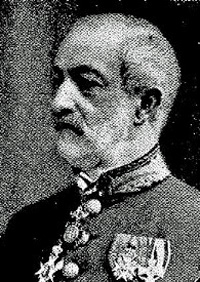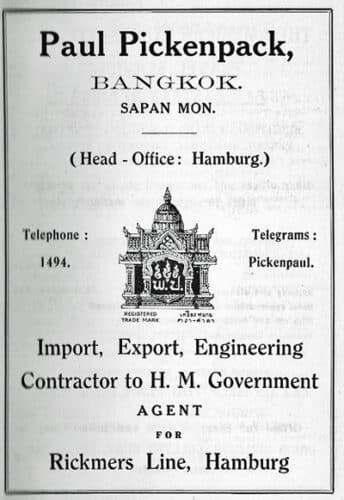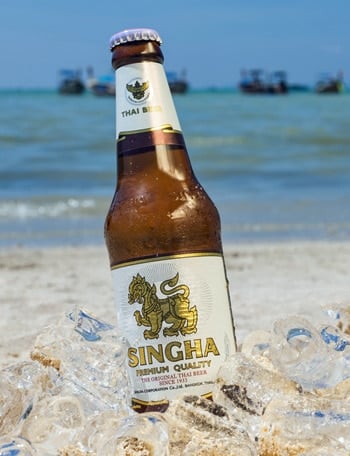
Paul Johann Martin Pickenpack
After Siam itself in 1855 by closing it Bowring Treaty had opened up to economic development with the British and far-reaching contacts with the West, it was not long before the Dutch also took an interest in Siam again.
Due to it Treaty of Friendship, Commerce and Navigation that the Kingdom of the Netherlands had concluded with Siam in 1860, the Dutch consulate was established in the Siamese capital that same year. The first, otherwise unpaid, Dutch consul in Bangkok was none Dutchman but the North German merchant Paul Johann Martin Pickenpack. The choice of Pickenpack was certainly not accidental.
Together with his brother Vincent, 26-year-old Paul, despite his young age, was one of the senior businessmen in Bangkok. On January 1, 1858, he and his trading partner Theodor Thiess had founded the first German firm in Siam. However, Paul Pickenpack was not only a trader, but also represented a number of financial institutions such as the Chartered Mercantile Bank of India, London and China Bank and the Hong Kong and Shanghai Banking Corporation in Siam. In this context it should certainly not go unmentioned that Paul was an agent for Siam and Burma of the Rotterdam Bank, one of the forerunners of the AMRO Bank. This bank specialized as a credit institution for companies that were active in the Dutch East Indies.
Paul and Vincent were co-owners of the American Steam Rice Mill, the largest foreign rice mill in Bangkok and acted as insurance brokers for the Colonial Sea and Fire Insurances Company, China Traders Insurance Company Ltd., the Yangtze Insurance Association and the Transatlantic Fire Insurance Company of Hamburg Ltd. And finally, they also had a lucrative monopoly as agents on the Singapore-Bangkok steamer line. Paul Pickenpack also turned out to be a devil-do-al on the diplomatic level. After all, he not only represented the Netherlands, but also Sweden, Norway and the German Hanseatic cities. The Hanze was an economic partnership that was founded in the 13e century had arisen between northern German merchants and independent cities in northwestern Europe with the intention of acquiring trading privileges and new markets. This resulted in a business empire that stretched from the Baltic to Bruges.
Although the Hanseatic League from the 16e century had lost importance, partly due to the development of the ports of wealthy city-states such as Bremen and Hamburg, it was still an economic power factor. In this last appointment, Pickenpack was a direct competitor for the booming Prussia, which was represented in Siam from April 1865 by Adolf Markwald and Paul Lessler of the business firm Markwald & Co. in Bangkok. This company was competitive with Pickenpack in more ways than one because, like him, it was very active in the shipping industry and insurance.
However, the conduct of the Dutch consul was not as impeccable as it should be and he clashed quite a few times with the Siamese authorities. For example, Pickenpack was accused of a conflict of interest a few times because he allegedly abused his dual status of diplomat on the one hand and trader on the other. The question is, however, to what extent such accusations were motivated by the jealousy or envy of competitors…
 In those early years, things were rather informal in the consular service, with Vincent, who was not accredited as a diplomat, standing in for his brother when he was on a business trip. When Paul returned to Europe in 1871, his brother submitted a motivated petition to the Minister of Foreign Affairs in The Hague to take over the consulate. However, the Siamese government had already submitted several complaints to the Dutch government about the policy and behavior of the two brothers, which made it impossible to appoint Vincent Pickenpack as consul of the Netherlands. It would have led to a major diplomatic row and nobody was waiting for that. Despite the complaints, a tacit extension of Pickenpack's mandate was agreed with the result that Vincent was an unpaid acting consul from April 1871 to June 1875. In the 15 years that the Pickenpack brothers represented Dutch interests, the consulate had always been located in the business premises of the firm Thiess & Pickenpack. Around 1880, Paul bought himself out and let Vincent, as a minority shareholder, continue the Paul Pickenpack firm in his name.
In those early years, things were rather informal in the consular service, with Vincent, who was not accredited as a diplomat, standing in for his brother when he was on a business trip. When Paul returned to Europe in 1871, his brother submitted a motivated petition to the Minister of Foreign Affairs in The Hague to take over the consulate. However, the Siamese government had already submitted several complaints to the Dutch government about the policy and behavior of the two brothers, which made it impossible to appoint Vincent Pickenpack as consul of the Netherlands. It would have led to a major diplomatic row and nobody was waiting for that. Despite the complaints, a tacit extension of Pickenpack's mandate was agreed with the result that Vincent was an unpaid acting consul from April 1871 to June 1875. In the 15 years that the Pickenpack brothers represented Dutch interests, the consulate had always been located in the business premises of the firm Thiess & Pickenpack. Around 1880, Paul bought himself out and let Vincent, as a minority shareholder, continue the Paul Pickenpack firm in his name.
In 1888 the folds with the Siamese were apparently ironed out and Paul Pickenpack was appointed Consul General of Siam for the Hanseatic cities. In April of the same year, he established the Siamese Consulate at No. 17 Tesdorpfstrasse in his hometown of Hamburg. In March 1900 he was one of the co-founders and later vice-chairman of the Ostasiatic Verein, a German interest group aimed at the economic opening up of Southeast Asia.
Paul Pickenpack died on October 20, 1903 in Hamburg. His son Ernst Martin succeeded him in 1908 as Consul General of Siam. He held this office until 1939.
 Oh yes, for lovers of the noble beer: The company Paul Pickenpack continued to exist even after the death of the founder. On a fine day in 1929, the then business manager, Herr Eisenhoffer, was visited by Praya Bhirom Bhakdi. The latter had successfully set up a ferry service across the Chao Phraya in 1910, but due to the planned construction of the Memorial bridge, the first fixed bridge connection between Bangkok and Thonburi, its ferry service was in danger of losing a lot of revenue. He was looking for new investments and so he ended up at Eisenhoffer, who treated him to a few glasses of German imported lager. Our Siamese businessman was so pleased with the taste of these fresh pints that in 1931 he submitted an application to set up the first brewery fully financed with Siamese capital. A brewery that started on August 4, 1934 as the Bean Rawd Brewery, the home brewery of Singha...
Oh yes, for lovers of the noble beer: The company Paul Pickenpack continued to exist even after the death of the founder. On a fine day in 1929, the then business manager, Herr Eisenhoffer, was visited by Praya Bhirom Bhakdi. The latter had successfully set up a ferry service across the Chao Phraya in 1910, but due to the planned construction of the Memorial bridge, the first fixed bridge connection between Bangkok and Thonburi, its ferry service was in danger of losing a lot of revenue. He was looking for new investments and so he ended up at Eisenhoffer, who treated him to a few glasses of German imported lager. Our Siamese businessman was so pleased with the taste of these fresh pints that in 1931 he submitted an application to set up the first brewery fully financed with Siamese capital. A brewery that started on August 4, 1934 as the Bean Rawd Brewery, the home brewery of Singha...
And for those who do not believe this impressive story: A few years ago at the brewery headquarters, the historic drinking party at Pickenpack was immortalized on a mural as the start of this success story. The next time you consume a Singha, think about that German Dutch Consul General who – posthumously – is the basis of this beer…


Fun, educational story. And entertaining. Reads nicely while enjoying a morning cup of coffee, and you also learn something from it. These kinds of articles have been appearing on this blog more and more lately. Kudos to both writer and editor. Keep going, I say!
Thanks again dear Jan. Although I would like to see source references for the various pieces. Then enthusiastic readers can dig even further themselves if their curiosity is stimulated.
Dear Rob,
My main source in this case was the sub-archive of the consular services in Bangkok in the National Archives in The Hague. It contains a nice amount of correspondence from and about the Pickenpacks. By the way, based on my research, I am planning a longer article about the Dutch consular services in Siam until 1945 and the colorful figures who were active here… As far as Singha is concerned, you can read everything on the website of the brewery
Ah, thanks for reporting Jan! I think most of us (no one?) will dive into the archives, but it's useful to know.
Great story, Lung Jan. What would Siam/Thailand have been without all those foreigners?
Just this quote:
After Siam had opened itself up to economic development with the British in 1855 by concluding the Bowring Treaty and far-reaching contacts with the West, it was not long before the Dutch also took an interest in Siam again.
That Bowling treaty was very unfair and one-sided, actually a colonial intervention on Siam and was not renegotiated until 1938 by the Efforts of Pridi Phanomyong. The treaty means that foreigners in Siam were not subject to Siamese law, but had to appear before a court of their consulate. Foreigners could do their thing with impunity in Siam in many areas, especially economically.
That is why we also speak of the Unequal Treaties, the unequal treaties that were concluded between various Western countries with various Eastern countries.